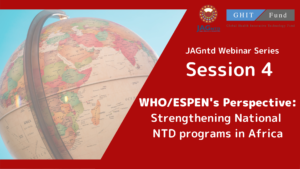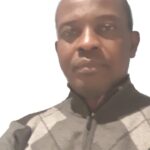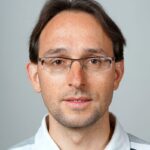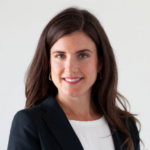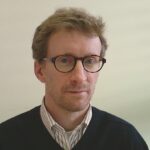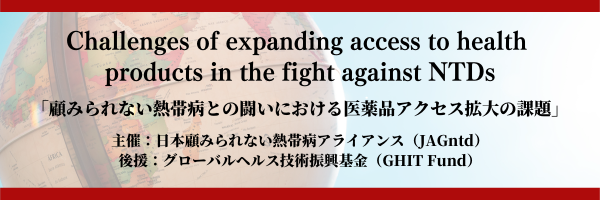
NTD webinar series (2nd collection)
“Challenges of expanding access to health products in the fight against NTDs”
Neglected tropical diseases (NTDs) prevail among the hard-to-reach populations in the world. To protect them from NTDs, developing good health products is necessary, but is not sufficient without creating access to them. Access is a complex matter: no single organization can create it successfully.
This webinar series will clarify some conceptual aspects about access, discuss key access challenges from different perspectives and how these can be overcome. The webinar series also considers how Japanese actors might be able to contribute to addressing some of those access challenges.
Language: English (Simultaneous interpretation in Japanese available)
Participation fee: Free
Organized by: Japan Alliance of Global Neglected Tropical Diseases (JAGntd)
Sponsored by: Global Health Innovative Technology Fund (GHIT Fund)
List of past webins (Click the title of each session to see an overview and recording of the completed webinar.)
|
Session 1 - "Concepts and Definitions: What is Access? (Chagas in the US as an example)" Monday, September 13, 2021 10: 00-11: 00 (Japan time)
|
|
|
Session 2 - "Developer’s perspective: Fexinidazole for African Trypanosomiasis" Thursday, October 14, 2021 16: 00-17: 00 (Japan time)
|
|
|
Thursday, November 18, 2021 16: 00-17: 00 (Japan time)
|
|
|
Session 4 - "WHO's Perspective: Strengthening National NTD Programs in Africa" Thursday, December 16, 2021 17: 00-18: 00 (Japan time)
|
|
|
Session 5 - "Nudging the Industry (1): Visualizing Pharmaceutical Companies' Efforts" Thursday, January 20, 2022 17: 00-18: 00 (Japan time)
|
|
|
Session 6 - "Nudging the Industry (2): Patent as a Barrier or Leverage?" Thursday, February 17, 2022 17: 00-18: 00 (Japan time)
|
|
|
Session 7 - "Financing: Who Pays for What?" Thursday, March 17, 2022 17: 00-18: 00 (Japan time)
|
|
Past sessions
Session 1 - "Concepts and Definitions: What is Access?"
|
Monday, September 13, 2021 10: 00-11: 00 (Japan time) Michael Reich; Professor Emeritus, Harvard School of Public Health Session 1 will clarify conceptual fogs around access. The term “access” is widely used, but often without a clear definition. The lecture by Prof. Reich will introduce an “access framework” that defines access and its related terms. As an example of using the access framework, Dr. Yoshioka (JAGntd) will present his study about access to Chagas disease treatment in the United States. The concepts and definitions introduced in Session 1 will be used throughout the webinar series. Book Reference:"Access: How do good health technologies get to poor people in poor countries?" |
|
Session 2 - "Developer’s perspective: Fexinidazole for African Trypanosomiasis"
|
Thursday, October 14, 2021 16: 00-17: 00 (Japan time) Olaf Valverde Mordt; Drugs for Neglected Diseases Initiative (DNDi) Session 2 focuses on fexinidazole, the first all-oral treatment for African Trypanosomiasis. This medicine was developed a few years ago in partnership with DNDi, Sanofi and many other organizations. DNDi and its partners are currently working together to deliver fexinidazole in African countries. Fexinidazole can be seen as a promising story of a drug developer engaging in delivering NTD medicines. The invited speakers will identify key access challenges and how DNDi has addressed them. |
|
Session 3 - "Country's Perspective: Introduction of Pediatric Praziquantel for Schistosomiasis in Tanzania"
|
Thursday, November 18, 2021 16: 00-17: 00 (Japan time) Peter Steinmann; Swiss TPH, Pediatric Praziquantel Consortium Session 3 examines challenges to introduce a new NTD drug from a country perspective. Pediatric praziquantel, though it is not yet approved by health regulatory authorities, is expected to provide a solution to treat children infected with schistosomiasis. This session will first invite Dr. Steinmann from the Pediatric Praziquantel Consortium to review the consortium’s global access strategies. Then, we focus on Tanzania. Dr. Yahya-Malima and Dr. Kazyoba will explain a project to get this country ready for the future introduction of pediatric praziquantel. This project in Tanzania is supported by the Access and Delivery Partnership, funded by the Government of Japan. This session will deepen your understanding of the preparations that can be made in a country level for accepting new drugs prior to their approval, focusing on the necessary communications and community engagement. |
|
Session 4 – WHO/ESPEN’s perspective: Strengthening national NTD programs in Africa
|
Thursday, December 16, 2021 17: 00-18: 00 (Japan time) Modeste Tezembong; Expanded Special Project for Elimination of Neglected Tropical Diseases (ESPEN), WHO/AFRO Session 4 looks into the WHO’s regional project to sweep five NTDs out of Africa, called Expanded Special Project for Elimination of Neglected Tropical Diseases (ESPEN). Working with African countries, ESPEN has contributed to mobilizing political, technical and financial resources to accelerate mass drug administration of donated medicines. From the WHO’s perspective, the speaker will discuss what kinds of assistance have been needed by African countries in order to deliver those medicines. The audience will find the importance of external assistance to distribute medicines among developing countries. |
|
Session 5 - "Nudging the Industry (1): Visualizing Pharmaceutical Companies' Efforts"
|
Thursday, January 20, 2022 17: 00-18: 00 (Japan time) Margo Warren; Access to Medicine Foundation Session 5 introduces the work done by the Access to Medicine Foundation (AMF). AMF is an independent non-profit organization whose mission is to stimulate and guide pharmaceutical companies to improve access to medicine in low- and middle-income countries. By publishing the Access to Medicine Index, the AMF fosters competition to improve access among pharma companies. The invited speaker will explain what AMF considers as key access barriers and how AMF has changed the pharma industry towards better access. This session also explores a view of a Japanese investment company that endorses AMF. The audience will understand the implication of AMF’s work on access to NTD medicines in the world. |
|
Session 6 - "Nudging the Industry (2): Patent as a Barrier or Leverage?"
|
Thursday, February 17, 2022 17: 00-18: 00 (Japan time) Esteban Burrone; Medicines Patent Pool Session 6 will explore the role of the Medicines Patent Pool (MPP). MPP is a United Nations-backed public health organization working to increase access to life-saving medicines for low- and middle-income countries. MPP uses patent pooling as a mechanism to improve access to medicines. MPP negotiates with drug patent holders and licenses those patents to multiple manufacturers, who develop the licensed medicine for a defined set of developing countries. The invited speaker will explain how this mechanism works and what access barriers can be addressed by this mechanism. The audience will explore the possibility of applying the same mechanism to NTD medicines. |
|
Session 7 - "Financing: Who Pays for What?"
|
Thursday, March 17, 2022 17: 00-18: 00 (Japan time) Cecilia Oh; Access and Delivery Partnership, UNDP Session 7 explores issues about financing to expand access to NTD medicines. While we do not know how much money we need to deliver NTD medicines to people who need them, some efforts have started to understand the landscape of the financing for access and delivery of NTD medicines. As one of such efforts, Session 7 presents a report published by the Uniting Efforts for Innovation, Access and Delivery in 2020. The invited speakers will provide an overview of existing strategies and needs to fund and finance access and delivery of NTD medicines. The audience will think of alternative financing models to fulfill current funding gaps. |
|




